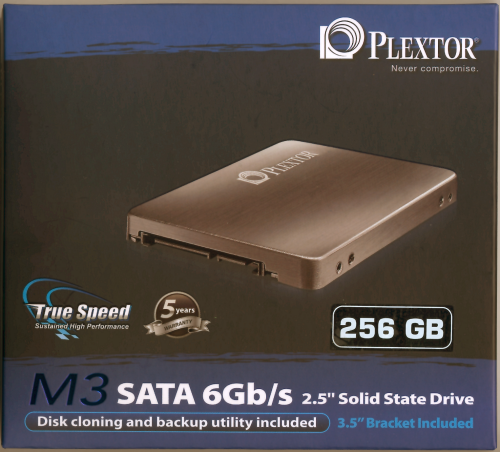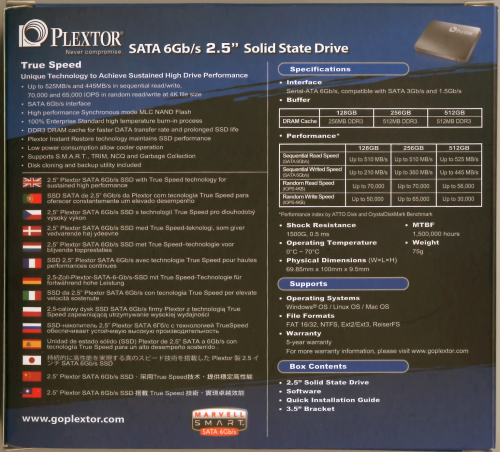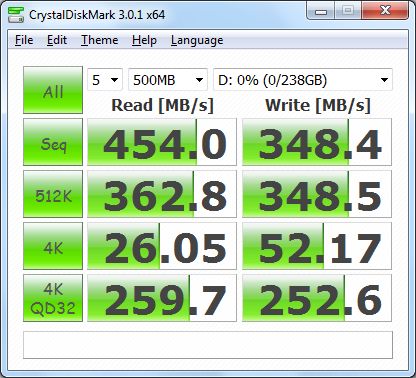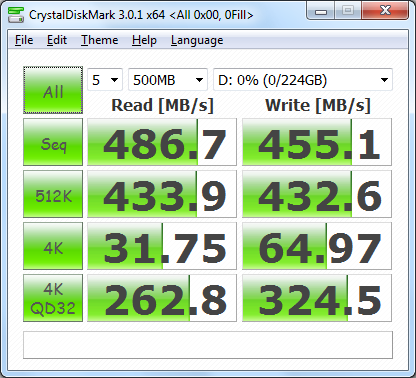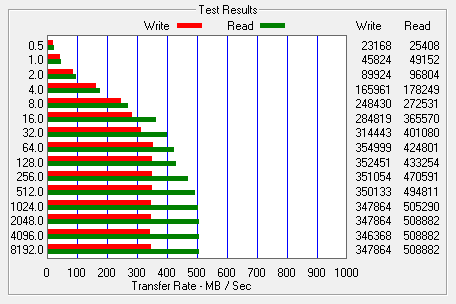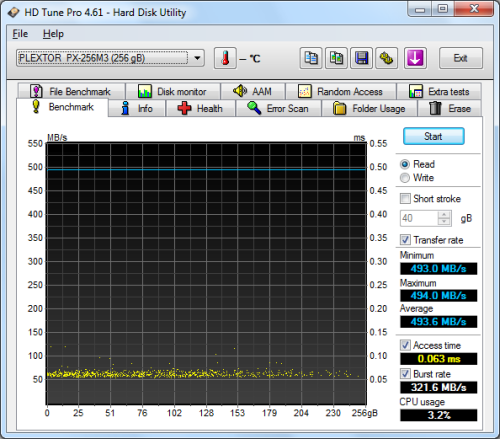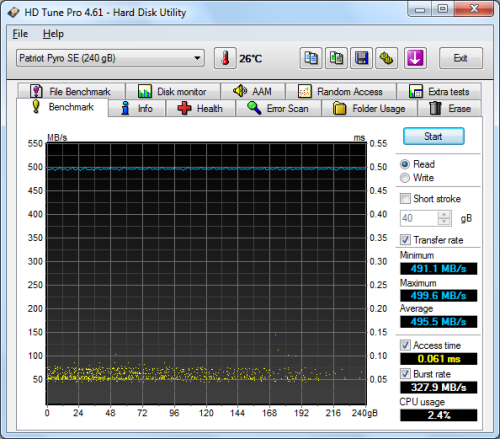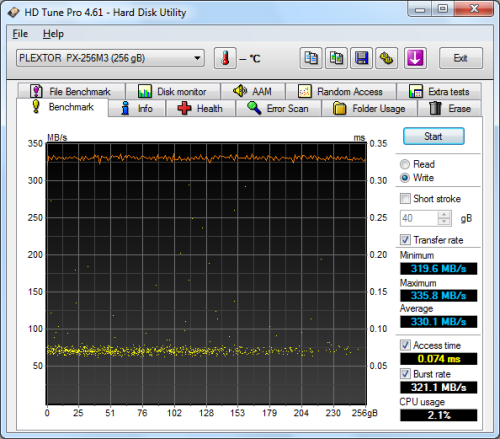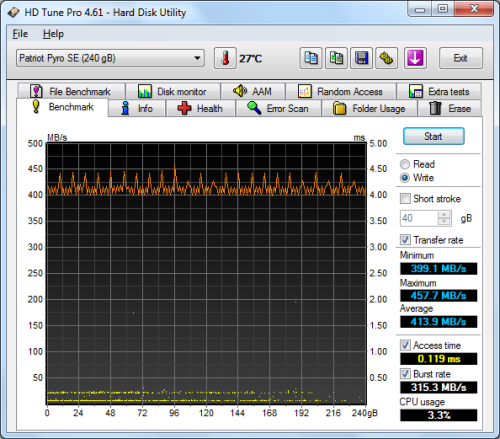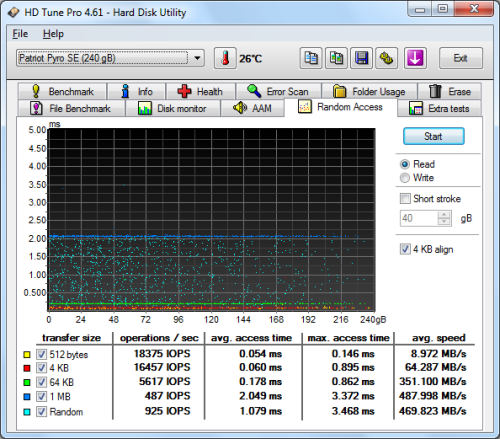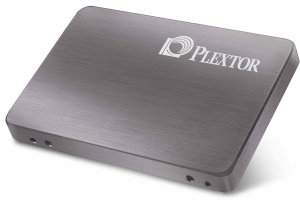

Model: Plextor PX-256M3S 256GB Solid State Drive
Manufacturer: Plextor
Provided By: Plextor LLC
As one of the biggest names in the storage industry, Plextor doesn't need much of an introduction. For more than a decade, they've produced some of the best optical drives the industry has seen. Known the world over for their quality, performance, and features, these drives have become favorites among consumers and professionals alike. Today, Plextor continues to lead the way by bringing cutting edge storage technologies to market. Along with a vast assortment of high-performance DVD and Blu-ray drives, the company offers a growing number of NAS devices, external hard drives and solid state drives.

While Plextor got off to a slow start, the company is shaping up to be a real contender in the solid-state drive (SSD) market. Last fall, the company launched its M2P series SSD. Powered by Plextor's exclusive True Speed technology, this limited-edition SSD leveraged high quality components like Marvell's server-grade 88SS9174 controller chip and Toshiba's 32nm Toggle NAND flash to deliver up to 500MB/s read and 440MB/s write transfer rates. It also featured an advanced firmware with Instant Restore, Global Wear Leveling, and Bad Block Management to maintain original performance levels, even after intensive use and long periods of operation.
Plextor has now released its M3S series SSD. Available in 128GB, 256GB, and 512GB capacities, this new drive uses the same Marvell 88SS9174 controller chip as the M2P series and shares many of the same features including a SATA 6Gb/s interface, native TRIM support and Plextor's True Speed technology. The main difference between the two is that the M3S uses Toshiba's new 24nm Toggle NAND flash to deliver up to 525MB/s read and 445MB/s write transfer rates. This flash technology also includes a 1.8V power mode for extremely low power consumption. To top it all off, Plextor backs the M3S series with an industry leading five-year warranty.
For this review, Plextor sent us the PX-256M3S. This 256GB SSD comes equipped with 512MB of on-board cache and is capable of delivering up to 510MB/s sequential read and 360MB/s sequential write speeds as well as up to 70,000 random read and 65,000 random write IOPS.
| Plextor PX-256M3S 256GB Solid State Drive | |||||||||||||||||||||||||||||||||||||||
General Specifications
Performance
Reliability
Power Consumption
Environmental
Dimensions and Weight
Other Features
|
Needless to say, this is only a taste of what the PX-256M3S has to offer. To give you an idea of what to expect, we'll take a closer look at Plextor's new 256GB SSD and then see how well it performs. Does the PX-256M3S have what it takes? Can it deliver the performance and features that we've come to expect from Plextor? Keep reading as we find out.
The PX-256M3S comes in a small, blue and black box. Along with a picture of the drive, the front advertises many of its key features including its 256GB capacity, SATA 6Gbps interface, True Speed technology and 5 year warranty. The back of the box provides a bit more information regarding its features, specifications and box contents. Inside, you'll find the SSD, a 3.5" adapter bracket, mounting screws, quick installation guide, warranty card and a CD containing NTI's SSD Utility Suite.
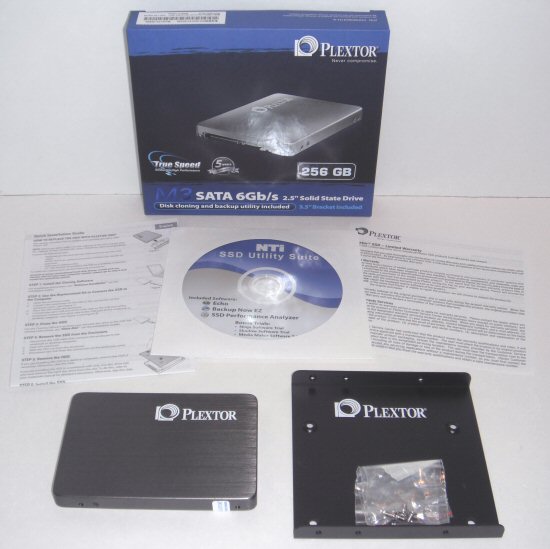
Physical Features:
Like Plextor's previous SSDs, the PX-256M3S is very well constructed. The drive's outer casing is made entirely out of metal. Along with it being strong and durable, it is very lightweight. On top of that, its brushed aluminum finish looks great.
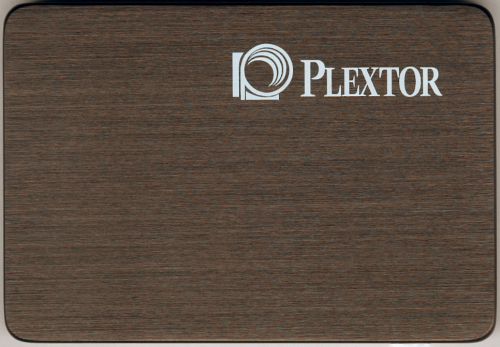
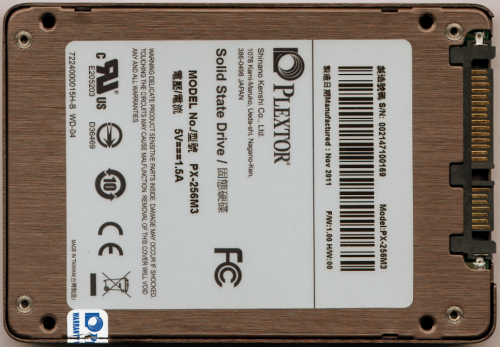
Plextor has also placed thermal pads on the controller, NAND flash and DDR3 cache chips. These pads transfer heat away from the components to the outer casing, which then acts like a large heat spreader.
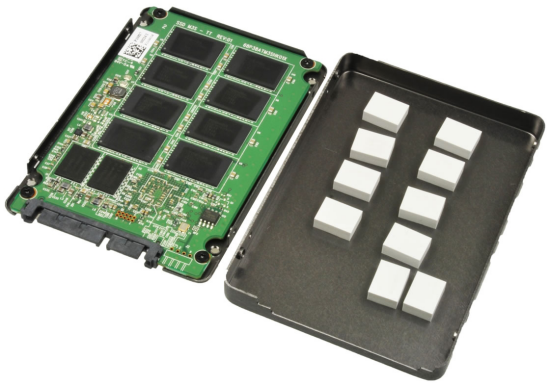
As I mentioned earlier, the PX-256M3S uses Marvell's 88SS9174-BKK2 controller chip. The 88SS9174-BKK2 can be found in a number of other high-performance SSD's including the Corsair Performance Pro and Intel SSD 510 as well as Plextor's own M2S and M2P series.

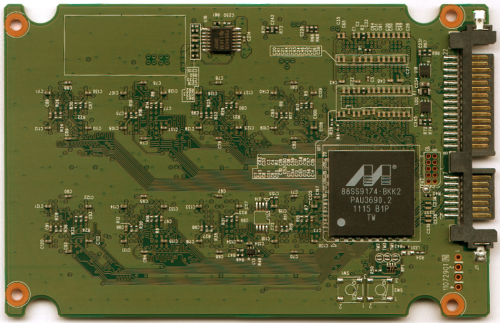
For the PX-256M3S, Plextor has opted to use Toshiba's 24nm TH58TEG8D2HBA8C Toggle Mode NAND flash chips. Looking at the picture above, you can see that there are eight of these chips on the top of the PCB. The drive also has two 256MB Nanya NT5CB128M16B-CG DDR3 memory chips that are used for caching and garbage collection.
The test system used in this review was an HP 8200 Elite. The computer came equipped with an Intel Core i5-2400 CPU, 4GB of DDR3 1333MHz memory, Seagate Barracuda 7200.12 ST3250312AS 250GB SATA 6 Gb/s hard drive, NVIDIA Quadro FX580 512MB PCIe graphics card and an Intel 82579-LM gigabit network card. For the operating system, I installed a fresh copy of Windows 7 Enterprise.
To test the performance of the PX-256M3S, I ran a series of benchmarks using CrystalDiskMark 3.0.1, HD Tach RW 3.0.4.0, ATTO Disk Benchmark 2.46, AS SSD, HD Tune Pro 4.61 and Iometer. For comparison, I've also included test results from the Patriot Pyro SE, Plextor PX-256M2P, Kingston HyperX, OCZ Vertex 3 and OCZ Agility 3.
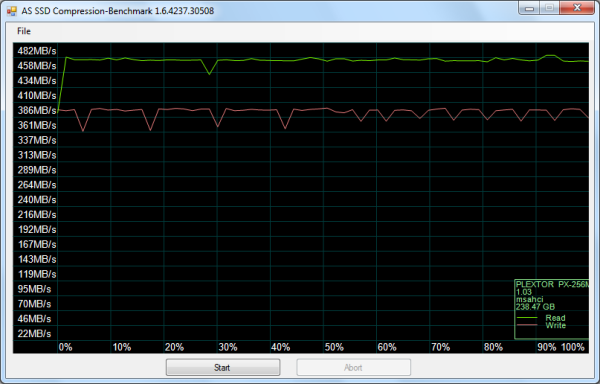
Like the PX-256M2P, the PX-256M3S is based on Marvel's 88SS9174 controller chip. While not as popular as some of the newer SandForce controllers, the 88SS9174 does have one major advantage in that it performs equally well with both incompressible (0%) and compressible (100%) data.
CrystalDiskMark 3.0.1:
First, I ran a few quick tests using CrystalDiskMark. This benchmark tool measures the performance of a storage device by testing its sequential read and write speeds as well as its random read and write speeds using blocks 512K and 4K in size.
According to Plextor, the PX-256M3S is capable of reading at 500MB/s and writing at 440MB/s when connected to a SATA 6 Gb/s port. While the drive performed well, it came up a bit short of these numbers in CrystalDiskMark's sequential read and write speed tests.
The PX-256M3S performed equally well when using highly compressible 0x00 (0 Fill) data. This time around, the drive was able to read at 453.4 MB/s and write at 349.1 MB/s.
HD Tach RW 3.0.4.0:
Next, I used HD Tach to test the PX-256M3S's read, write and burst speeds as well as its seek times and CPU usage.
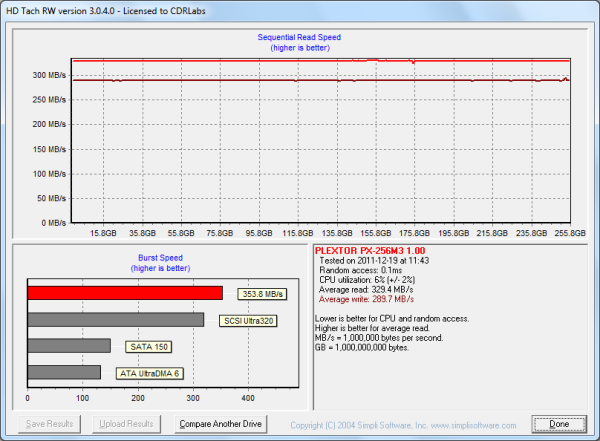
Looking at the screenshot above, you can see that the PX-256M3S had average read and write speeds of 329.4 MB/s and 289.7 MB/s respectively, as well as a burst speed of 353.8 MB/s.
ATTO Disk Benchmark 2.46:
I also used ATTO Disk Benchmark to test the PX-256M3S's sequential read and write speeds. The tests are run using blocks ranging in size from 0.5KB to 8192KB and the total length set to 256MB.
When tested with ATTO, the PX-256M3S's read speeds topped out at 508 MB/s and its write speeds at nearly 355 MB/s.
AS SSD:
AS SSD is a relatively new benchmark designed specifically for solid state drives. The application contains five synthetic tests used to determine the sequential and random read and write performance of a drive.
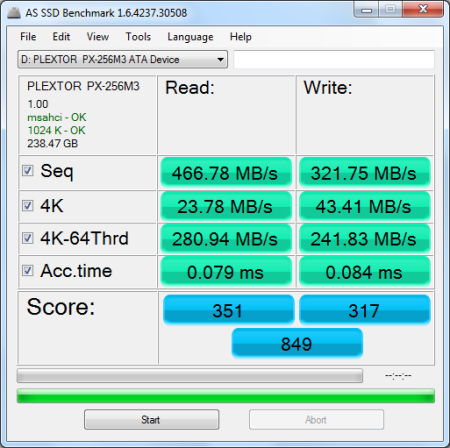
AS SSD also includes a copy benchmark. This test copies an ISO (two large files), program (many small files) and game (small and large files), returning the speed and duration of each.
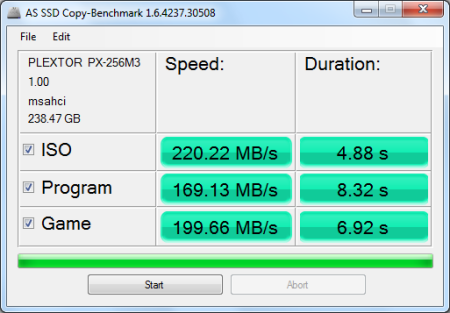
HD Tune Pro 4.61:
Next, I ran a series of tests using HD Tune Pro. This hard disk utility measures a drive's performance by testing its sequential read and write speeds as well as its access time, burst rate and CPU usage. For this review, I'm also going to use it to benchmark the PX-256M3S's random read and write speeds, random access times and the number of operations per second.
The PX-256M3S performed fairly well when benchmarked with HD Tune. The drive had average read and write speeds of 493.6 MB/s and 330.1 MB/s, respectively, as well as a burst rate of 321 MB/s.
The PX-256M3S didn't perform as well as the Pyro SE when doing random reads and writes. Nevertheless, when writing 4KB blocks, the drive reached 13269 IOPS and had an average speed of 51.833 MB/s.
Iometer:
Lastly, I ran a series of tests using Iometer. This tool can be configured to benchmark a number of things. In this case, I used it to measure the PX-256M3S's read and write speeds and the number of operations per second. The tests were run using random bytes and a queue depth of 3.
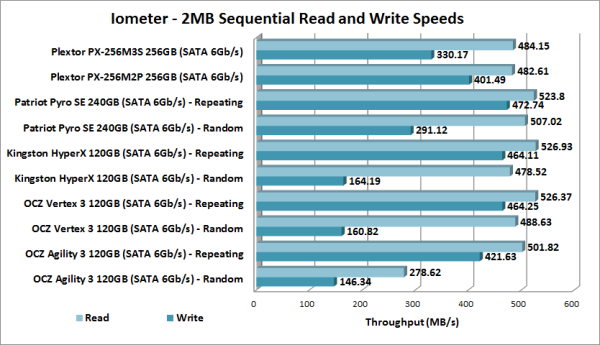
The PX-256M3S's performance was very similar to what we saw in our other tests. With an average read of 484.15 MB/s, Plextor's new drive was slightly faster than the PX-256M2P when reading. However, when it came to writing, the PX-256M3S was more than 70 MB/s slower than its sibling.

The PX-256M3S performed surprisingly well when doing random reads and writes. In our tests, the drive was able to write at 208.43 MB/s and read at a blazing 131.51 MB/s. This wasn't enough to top the SandForce-based drives when doing random writes with highly compressible, repeating data. However, the PX-256M3S was about 28 MB/s faster than the Patriot Pyro SE when writing random data.
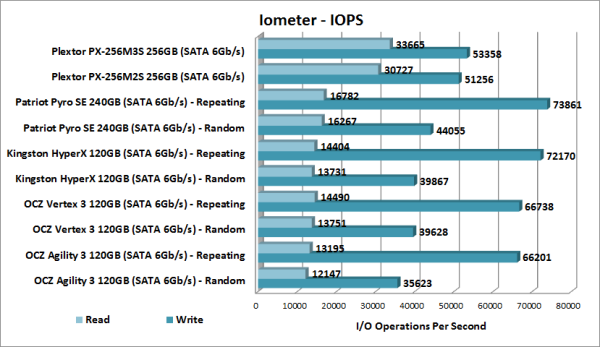
According to Plextor, the PX-256M3S is capable of 70,000 IOPS when reading and 65,000 IOPS when writing 4K blocks. In our tests, the drive reached 33,665 random read IOPS and 53,358 random write IOPS. The only way I was able to match Plextor's numbers was to increase the queue depth. With the queue depth set to 32, the PX-235M3S reached 71,606 random read IOPS and 66,335 random write IOPS.
TRIM and True Speed:
While SSD's offer many benefits, there are some downsides to using flash memory. One of the biggest issues people run into is performance degradation. Over time, an SSD will run out of fresh blocks and will have to write over data the file system has marked as deleted. This procedure is very complicated and can slow an SSD's write speeds considerably.
To fix this problem, most manufacturers have added TRIM support to their SSDs. The TRIM command allows an operating system, such as Windows 7, to tell an SSD which data blocks are no longer in use. Using this information, the drive pro-actively erases these blocks and adds them to the free block pool.
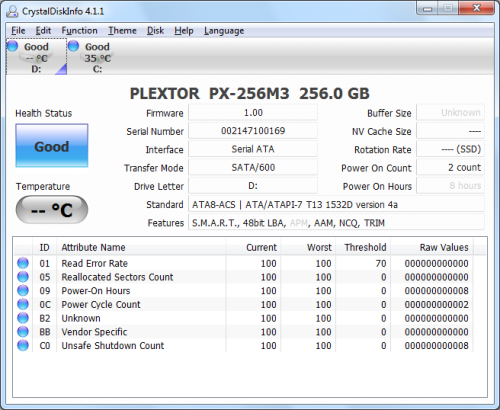
The M3S is the second series of drives to ship with their Plextor's exclusive True Speed technology. By leveraging the power of advanced firmware, True Speed ensures that the SSD works at its full potential even after extensive use and long periods of operation. Along with support for TRIM, the M3S's firmware incorporates Plextor's Bad Block Management, Global Wear Leveling and Instant Restore technologies. Where Bad Block Management and Global Wear Leveling optimize the way data is written on the drive, Instant Restore maintains "like new" performance by reorganizing data to maximize the number of free cells.
Plextor's True Speed technology works very well, as I saw very little performance degradation, even after hours of testing. I was finally able to overwhelm it by using Iometer to fill the entire drive and then running a random write test for 20 minutes. This had very little impact on the PX-256M3S's read speed. However, its average writing speed dropped to 100.9 MB/s when in this "dirty" state.
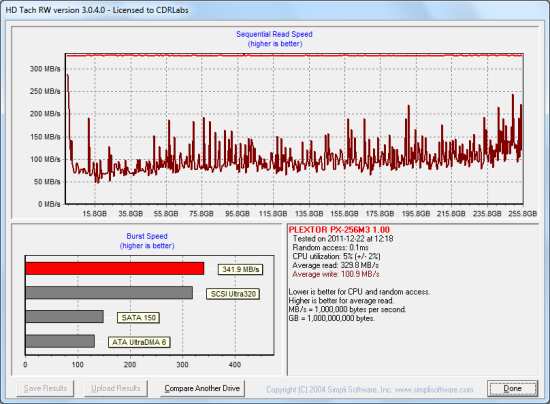
Plextor PX-256M3S - Dirty
To see how well the PX-256M3S could recover, I let the computer sit for a few hours and then reran the test. Looking at the screenshot above, you can see that the drive's average writing speed had increased to 258.8 MB/s.
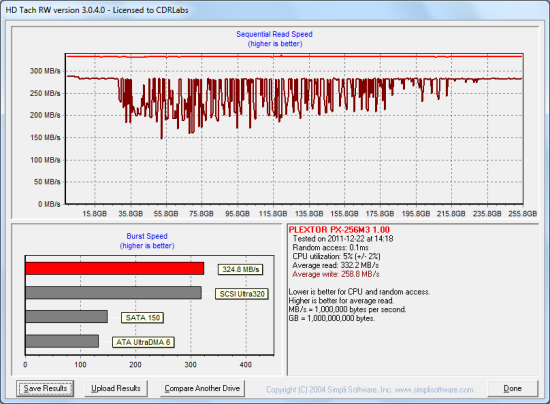
Plextor PX-256M3S - After Instant Restore and TRIM
Lastly, I used LtnSSD to pre-format the PX-256M3S. With the drive wiped clean, its read speed jumped back up to 289.4 MB/s.
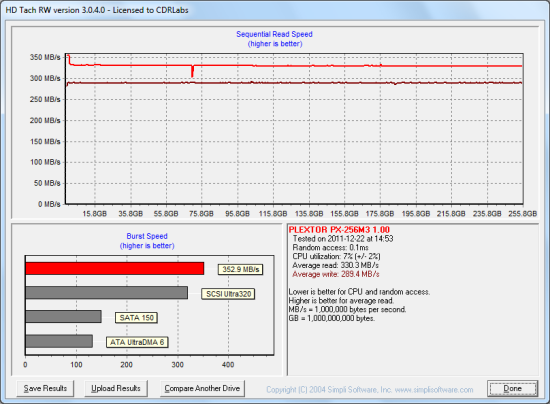
Plextor PX-256M3S - Wiped
Final Thoughts:
If you're looking for the best bang for your buck, Plextor's new M3S series SSD just might be it. Based on the same Marvell 88SS9174 controller as the company's M2P series, the M3S combines Toshiba's 24nm Toggle NAND flash with Plextor's exclusive True Speed technology to deliver some great, all around performance. In our sequential read and write tests, the PX-256M3S was able to read at speeds as high as 508 MB/s and write at speeds in excess of 350 MB/s. These numbers aren't as high as what we've seen with some of the newer SandForce-based drives. However, the M3S performs equally well with compressible and incompressible data and, thanks to technologies like Instant Restore, Global Wear Leveling and Bad Block Management, is able to sustain these speeds, even after intensive use.
The M3S series is available now in 128GB and 256GB capacities and a 512GB version is coming later this year. The PX-128M3S currently retails for about $185 with the PX-256M3S reviewed here going for around $389 on Amazon or for as little as $365 at places like Newegg.

Highs:
- True Speed technology
- Available in 128GB, 256GB and 512GB capacities
- Fast sequential read speeds
- Performs equally well with compressible and incompressible data
- Consistent performance, even after intensive usage
- SATA 6Gb/s interface
- Toggle NAND flash
- Massive 512MB cache on PX-256M3S and PX-512M3S
- Exclusive firmware with Instant Restore, Global Wear Leveling and Bad Block Management
- Supports TRIM, SMART and NCQ
- Low power consumption
- Includes a 2.5" to 3.5" adapter bracket
- Includes NTI SSD Utility Suite
- 5 year warranty
Lows:
- Not as fast as SandForce-based SSDs when reading and writing compressible data
- Slower than M2P series when doing sequential writes


